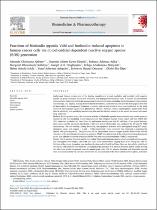| dc.contributor.author | Ajibare, Abosede Christiana | |
| dc.contributor.author | Ebuehi, Osaretin Albert Taiwo | |
| dc.contributor.author | Akinyede, Kolajo Adedamola | |
| dc.date.accessioned | 2022-08-30T08:44:34Z | |
| dc.date.available | 2022-08-30T08:44:34Z | |
| dc.date.issued | 2022 | |
| dc.identifier.citation | Ajibare, A. C. et al. (2022). Fractions of Hoslundia opposita Vahl and hoslundin induced apoptosis in human cancer cells via mitochondrial-dependent reactive oxygen species (ROS) generation. Biomedicine and Pharmacotherapy, 153, 113475. https://doi.org/10.1016/j.biopha.2022.113475 | en_US |
| dc.identifier.issn | 0753-3322 | |
| dc.identifier.uri | https://doi.org/10.1016/j.biopha.2022.113475 | |
| dc.identifier.uri | http://hdl.handle.net/10566/7779 | |
| dc.description.abstract | ancer remains one of the leading causalities of several morbidity and mortality with negative
impact on global economy due to low workforce and management/treatment cost. A number of conventional
therapies have been explored in the management/treatment of cancer including chemotherapeutic intervention,
radiotherapy, and surgery. Among these treatment modalities, chemotherapy remains the most popular first line
of intervention in management/treatment of cancer, and natural products have been implicated as the main
source of antineoplastic agents with phenomenal efficacy. However, current antineoplastic agents suffer from
lack of selectivity and specificity necessitating the need for further research in the search for novel anticancer
drug molecules. | en_US |
| dc.language.iso | en | en_US |
| dc.publisher | Elsevier | en_US |
| dc.subject | Cancer | en_US |
| dc.subject | Tumourigenic | en_US |
| dc.subject | Hoslundin | en_US |
| dc.subject | Natural products | en_US |
| dc.subject | Chemotherapy | en_US |
| dc.title | Fractions of Hoslundia opposita Vahl and hoslundin induced apoptosis in human cancer cells via mitochondrial-dependent reactive oxygen species (ROS) generation | en_US |
| dc.type | Article | en_US |

